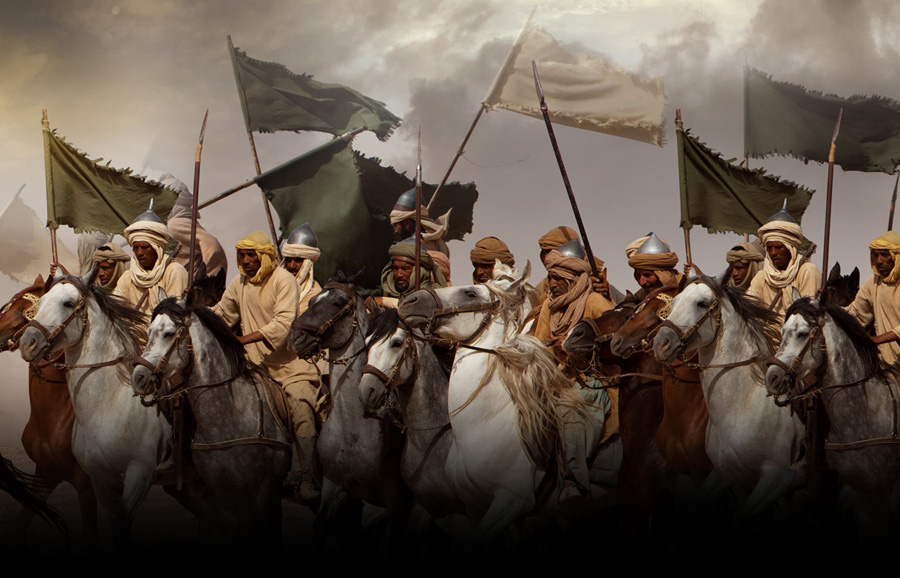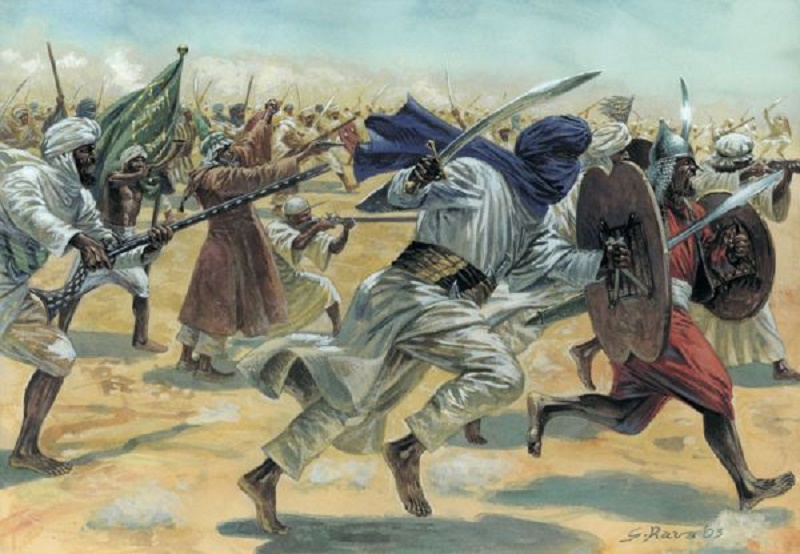
Permission to Fight AND BATTLE OF BADR
The Muslims gradually amassed power and became strong enough to fight against their enemies.
They were first told to resist aggression and then later on permitted to fight against the mischievous ones. But it was only a permission rather than an obligation to takeup arms against the enemies.
“Sanction is given unto those who fight because they have been wronged; and Allah is indeed able to give them victory.” [Qur’an 22:39]
EXPEDITION OF ABWA AND ‘ABDULLAH B. JAHSH
In pursuance of the command given by Allah, the Prophet (r) started sending out small expeditions to discourage hostile tribes.
These expeditions were not meant to launch out any attack against the enemy but simply to frighten people hostile to Islam by way of a show of force.
We shall mention here one of the earliest expeditions, led by ‘Abdullah b. Jahsh, for it embodied a revelation sent down by Allah which shows that Islam does not countenance the least excesses or high handedness even from its own followers.
Islam is always fair and impartial, without any regard to persons or parties, in bringing up its verdict on every affair.
The Prophet (r) sent ‘Abdullah b. Jahsh on an expedition with eight emigrants during the month of Rajab 2 A.H.
He gave him a letter with the instruction that he was not to read it until he had journeyed for two days, and then act according to the directions contained therein by leaving his companions the decision to remain with him or turn back of their own choice.
So, Abdullah b. Jahsh read the letter after having traveled for two days.
The instruction contained in it was,
“When you have read this letter, proceed to the oasis of Nakhlah between Makkah and Ta’if. Install your tents there to find out the movements of the Quraysh and send the information to us.”
Having gone through the letter ‘Abdullah b. Jahsh said. “We hear, and we obey;”
and then he said to his companions.
“The Prophet (r) of Allah has ordered me to lie in waiting at the oasis on the road between Makkah and Ta’if and watch the movements of the Quraysh so as to deliver news for him, but he has also asked me not to compel anyone of you to follow me. If anyone wishes martyrdom, he may come with me, and whoever wishes against it may go back, for I have abide by the instructions of the Prophet (r).
” Then he went ahead, and so did all of his comrades, with none of them falling out.
The party moved on to the particular oasis where they camped. In a short while, a caravan of the Quraysh that included Amir B. Al-Hadrami passed by them.
When the Qurayshites saw the party encamped near them they got frightened but after seeing ‘Ukkasha whose head was shaved, their suspicions vanished for they regarded the party as pilgrims.
They said: “Nothing to fear from them, they are pilgrims.”
That was the last day of Rajab. The Muslim party on the other hand deliberated among themselves and decided that if they left the Qurayshites alone that night, they would get into the sacred area and obstruct their entry there; but if they fight them, they would be devaluing the sacred month by instituting a bloody confrontation.
At first they felt hesitant as well as dismayed but ultimately made up their mind to kill as many of the Quraysh as possible and plunder as much of their goods as they could. Waqid b. ‘Abdullah at-Tamimi shot the first arrow killing ‘Amr b. al-Hadrami while his companions captured two of the Qurayshites. ‘Abdullah b. Jahsh and his companions returned to Madina with their captives.
When ‘Abdullah b. Jahsh and his companions reported the incident to the Prophet (r), he said:
“I did not ask you to fight in the sacred month, nor seize the caravans and take captives.”
The Prophet (r) refused to accept the spoils brought to him by the transgressing group.
The campaigners were worried and fearfully apprehensive of being doomed. Besides, the other Muslims also harshly reproached them for what they had done. At the same time, Quraysh laid a charge, saying,
“Lo! Muhammed has allowed war and bloodshed in the sacred months!”
It was on this occasion that Allah sent down the revelation to the Prophet (r). “They question thee (O Muhammed) with regard to warfare in the sacred month. Say:
warfare therein is a great (transgression), but turn (men) from a way of Allah, and to expel the people thence, is greater (sin) with Allah; for persecution is worse than killing.” [Qur’an 2:217]
Ibn Qayyim writes about the meaning of this verse in Zad al-Ma’ad:
“Allah has given a fair deal to His friends as well as foes, for He has not commended the sin of fighting in the sacred month that was committed by His pious and devout servants. Allah has held it to be a serious act of transgression. At the same time, He reminds the idolaters that they have been guilty of even greater sins through their acts of persecution in the sacred city of Makkah, and thus they still deserve more condemnation and punishment.
Since, however, the believing servants of Allah had been guilty of indiscretion or that they had committed a mistake, Allah has lent them a hope. He had given them hope that they might be forgiven on account of their faith in the Unity of Allah, submission to Him, migration with the Prophet (r) and their sacrifices towards His way.” (Zad al-Ma’ad, Vol. I, p. 341)
FASTING MADE OBLIGATORY BEFORE BATTLE OF BADR

When the Muslims had taken prayer as a mark and symbol of their faith it had been indelibly ingrained in their hearts and souls. Then it was, in the second year of Hijrah, that Allah commanded them to also observe fasting, hence:
“O ye who believe! Fasting is prescribed for you, even as it was prescribed for those before you, that ye may ward off (evil).” [Qur’an 2:183]
In another verse, the Qur’an says:
“The month of Ramadhan in which was revealed the Qur’an, a guidance for mankind, and clear proofs of the guidance, and the Criterion (of right and wrong). And whosoever of you sights the crescent, let him fast the month.” [Qur’an 2:185]
DECISIVE BATTLE OF BADR

The circumstances that led to this battle began with the news received by the Prophet (r) that a great caravan with lots of money and merchandise,
was being led by Abu Sufyan on its way back to Makkah from Syria.
A state of belligerence already existed between the Muslims and the Quraysh, for the Quraysh was by this time doing all that was in their power to harm and abuse the Muslims, to impede their progress, and to topple their rising power.
They were sparing none of their financial and physical resources to get on the job and their
armed detachments very often penetrated deep into the limits of Madinah and its pastures to pound upon the Muslims.
As we may know that the Muhaajiroon have left all their houses and most of their wealth back in Makkah and as a result of that this was a good reason to capture this caravan. The Prophet (r) asked the Muslims to get ready to intercept the caravan. However, since it was a commercial caravan, the Prophet (r) did not make any elaborate arrangements for fighting, but merely positioned himself in order to catch the caravan flat-footed.
Informed of the Prophet’s (r) decision to stop him, Abu Sufyan sent a courier to Makkah with an urgent request for reinforcements. Thereupon, the Quraysh ably supported and accompanied by all the notable chiefs of Makkah hastily formed an armed force. Such support group enlisted every man available therein from the neighboring tribes – and this army went forth to assist the caravan. The Quraysh were so flared up that hardly a man was left behind in Makkah.
News came to the Prophet (r) that a strong Makkan army was on its way to engage him in a battle. The Prophet (r) thereupon summoned his followers and solicited for their advice.
He really wanted to ascertain the reaction of the Ansaars, for, their original oath of allegiance with him obliged them to defend him in Madinah and did not compel them to take part in a military expedition outside their territory. The Muhaajiroon responded first and assured him of their help and loyalty. The Prophet (r), however, repeated his appeal and the Muhaajiroon gave similar reply but the Prophet (r) threw the same question once again for the third time.
Now the Ansaar realized that the question was meant for them. S’ad b. Mu’ad immediately got up to say in reply,
“O Prophet of God (r), it appears that the question is directed to us and you want to have our answer. Perhaps you think, O Prophet of God (r), that the Ansaar have offered to help you on their own territory only. I want to tell you in behalf of the Ansaar that you may lead us wherever you like, align with whom you may desire or break relations with whom you may think fit; you may take whatever you desire from our property and give us as much as you want; for, whatever you would take from our property would be dearer to us than what you would leave for us. We will follow whatever you command us to do. By God, if you go ahead until you reach Bark Ghimdan, we will accompany you, and by God if you march into the sea, we will also do it with you.”
The battle took place on the 17th of Ramadhan, 2nd year of Hijrah. Badr is situated 160-km southwest of Madinah. The battle was between the Muslims as one side and Quraysh idolaters, where the Muslims army were consisting of 313 to 317 men with two horses and 70 camels, on the contrary Quraysh army were consisting of 1000 men with 100 horses, 6oo suits of armor, and many camels.
70 men were killed among the Quraishities army, and 70 were captured, where only 14 of the Muslims were killed.
The result of the battle was a great victory for the Muslims over their enemy.
OTHER EXPEDITIONS
The ironclad oath of Abu Sufyan, as mentioned earlier, bound him to refrain from even splashing water over his head until he had wreaked havoc on the Muslims. The chief of the Jewish tribe of Bani an-Nadir, who offered the information he desired about Madinah. Thereupon Abu Sufyan succeeded in getting away after killing two of the Ansaars.
The Prophet (r) got a warning of the evil raiders and went out in their pursuit. Abu Sufyan eluded the Prophet (r) but was obliged to throw away a good deal of his provisions consisting of food grains, especially parched corn or al-sawiq, and hence the expedition goes by such a name.
The Jews of Madinah who first broke their covenant with the Prophet (r) were Banu Qaynuqa. They contended with the Muslims and spoke scornfully of the Prophet (r).
Ultimately, the Prophet (r) besieged them – the siege lasting for fifteen nights – until Banu Qaynuqa surrendered unconditionally. The attack had been instigated on the recommendation of ‘Abdullah b. Ubayy, the leader of the hypocrites.
Banu Qaynuqa operated a market in Madinah and practiced crafts such as that of the goldsmith trade. (Zad al-Ma’ad, Vol. p. 348)
They were forced to abandon the city although the number of people who could bear arms among them was seven hundred.
for prophets stories visit https://sunofislam.com/prophetsofgod/
for scientific miracles articles visit www.sunofislam.com
